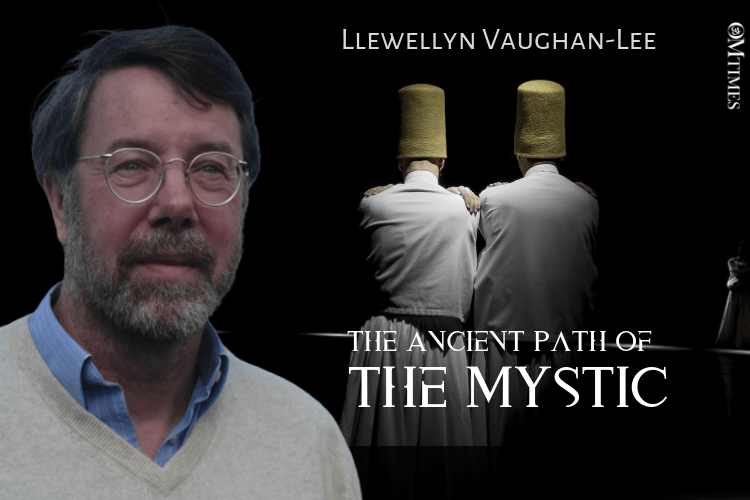Llewellyn Vaughan-Lee: The Ancient Path of The Mystic

Llewellyn Vaughan-Lee: Love expresses itself as a masculine and feminine quality. The masculine side of love is, “I love you.” Love’s feminine side is, “I am waiting for you. I am longing for you.” The Sufis say it is this longing that takes us most directly back to God. Why? Because in the depths of each of us, in our soul, there is a longing to be reunited, to experience the oneness that is our true nature. Rumi, the great Sufi poet, begins his most famous poem, the Masnavi, with the cry of the reed torn from the reed-bed, longing to return to the Source. St. Augustine called it “divine discontent.” Most people project this feeling, this longing for love and oneness, onto another person. But the mystic, the one who is drawn deep within the heart, discovers a fundamental truth.
Again to quote Rumi, The minute I heard my first love story, I started looking for you, not knowing how blind that was. Lovers don’t finally meet somewhere, they’re in each other all along.
Deep within the heart of each of us, the place the Sufis call the “heart of hearts,” this secret of love and oneness is present. The Sufi wayfarer suffers the pain of longing that draws them to the fire of love that burns away all traces of separation, revealing the truth that we are always one with God, lover and Beloved are always united in love. Sufis are known as “the people of the secret” because they discover and live this divine secret.
OMTimes: In some other interviews you mentioned the three Journeys in Sufism, can you explain what they are?
Llewellyn Vaughan-Lee: The Sufis say there are three journeys: the journey from God, the journey to God, and the journey in God. The journey from God is the journey of forgetfulness, as we grow up and forget our divine nature. As the American poet, E.E. Cummings wrote so poignantly and down they forgot as up they grew autumn winter spring summer.
Young children often remain aware of the divine world that is around them, until, surrounded by adults who have forgotten, they too forget. Going to school, competition, and life’s outer demands take us on a path further and further away from remembering where we came from, from our soul and the light of the divine. We become more and more immersed in the “ten thousand things” of this world, thinking that this outer reality is all that exists. Until one day, in a moment of grace, we awaken, we remember our divine nature. It can be through the beauty of nature, a star-filled sky, or a broken heart, or a meeting with a spiritual teacher. But it is always a moment that is given, an act of grace. The early Sufi saint Rabia’ was once asked, “If I turn away from the world and turn towards God, will He turn towards me?” And she replied, “No, never. First He has to look towards you, and then you can turn towards Him.” As I have mentioned for me, it was reading a Zen koan that awoke me out of the grey world of my middle-class background. It was an unexpected, unexplained miracle, opening the door to light and laughter. Then the spiritual search begins, the search for a teacher or a path to lead us home.
Sadly many who awake for an instant, see the light or love around them, then turn back to the world of forgetfulness, and never make the journey. The doors of this world close so easily, its distractions are so many. Some people even create an illusion of the spiritual path, filled with images of what they want, rather than any deeper selfless truth. To live the light of the heart is not easy. The mystical life is love’s greatest adventure, but also the most demanding journey on which we have to face our darkness even as we are drawn towards the light.
In Rumi’s words, it is: Not for brittle, easily-broken, glass-bottle people. The soul is tested here by sheer terror, As a sieve sifts and separates Genuine from fake.
But through determination, devotion, love, longing, and a sense of humor, those who persevere are taken by love back to love. In the Sufi tradition, they are taken through the chambers of the heart, the esoteric secrets of our human and divine nature, until, in the heart of hearts they discover their essential state of divine oneness. This is where the journey in God begins, as our individual self is slowly dissolved deeper and deeper in the states of the union, and the Beloved reveals in the heart of the lover the intimacies of love’s tenderness, the states of ecstasy and bliss. Little can be said of these later stages of the journey because the footsteps that have taken us to the shore of love’s ocean are lost, just as the lover becomes more and more lost in love. This is the “dark silence in which all lovers lose themselves.”
OMTimes: T.S. Elliot Said: “We shall not cease from exploration, and the end of all our exploring will be to arrive where we started and know the place for the first time.” Does the Quality, the intensity of the Longing for God change with time, or circumstances and can be differentiated according to different life passages or phases of life?
Llewellyn Vaughan-Lee: The heart’s longing, the homesickness of the soul, is often what starts us on the journey. This primal sadness turns us away from the desires of the senses and the world of the ego, often making outer experiences and attractions tasteless, without value. We cry and cry, knowing only the absence of our Beloved. My teacher came back from India with a blue handkerchief that had been bleached white by all the tears she had cried. We know nothing except the depths of our longing and heartache.
But then, imperceptibly at first, something changes. Something is present within the heart that was not there before. There is a sweetness, a sense of presence. In the beginning, these tender moments are fleeting, and we are thrown back into states of abandonment, longing, our tears flow again. But as the months and years pass, the times of pure pain grow less, the longing turns into love. Yes, longing can often remain, but a nearness also becomes known. Our Beloved has not deserted us, has not betrayed us. One we love is alive within us.
The states of love change, the mysteries of the path unfold. Longing can return, unbidden, unexpected. But once we have tasted the truth of divine presence, once we know how much we are loved, something fundamental shifts, even the cells of our body are altered as love becomes more and more permanent. Then one day, unexpectedly, we realize we have come Home, back to where we belong. Yes, it is always the same place from where we started—the oneness to which we truly belong. But now we know it. We have paid the price of separation and are able to rest in the union. Our Beloved is always with us.
OMTimes: What is the role that the Ego plays on the Journey back to God, and why it is Important to have an Ego?
Llewellyn Vaughan-Lee: The ego and the mind are necessary to live in this world, and yet they are the two greatest obstacles on the mystical journey. The mind, with its constant chatter and recycling patterns of thought, cuts us off from the direct experience of the higher levels of reality. The ego—with its illusory sense of a separate self, and all of its patterns of identity—isolates us from experiencing our divine nature, our oneness with God. In the words of an early Sufi, “Between you and I there lingers an ‘it is I.’ Oh God, through Thy mercy, lift this ‘it is I’ from between us both.”
Much of the work of the journey back to God is to free oneself from the limitations of the ego. In Sufism, this is described as the process of fana, annihilation, that leads to baqa, abiding in God. My first experience when I met my teacher, of becoming a speck of dust on the floor, was a foretaste of this process, this loss of self. Initially, the ego fights any loss of control, and it is a painful process. But slowly we learn to surrender ourself, our desire for control. And in these later stages, as the ego is dissolved in the greater power of divine love, it is a great relief to lose this limited sense of self and experience the vaster dimension of our divine nature. These experiences mainly happen in meditation or prayer, where one leaves the mind and the ego behind and awakens to a very different dimension—states that can initially be very confusing and bewildering. But then one does have to return to the “reality” of the outer world, for which one needs a mind and an ego. Otherwise, it is too difficult to function in daily life. This is why the Sufi is often known as “a soldier of the two worlds”—we live in the outer world while being inwardly more and more deeply immersed in a formless reality of light and love.
Continue to Page 3 of the interview with Llewellyn Vaughan-Lee
Creatrix from Sirius. Fairly Odd Mother of Saints (Bernards). Fish Tank aficionado by day ninja by night. Liane is also the Editor-in-Chief of OMTimes Magazine, Co-Founder of Humanity Healing International and Humanity Healing Network, and a Board Member of Saint Lazarus Relief Fund.





